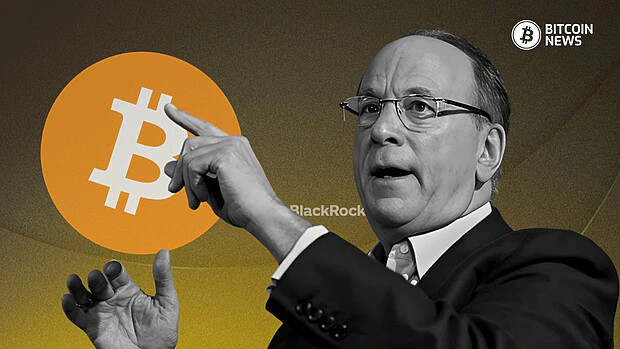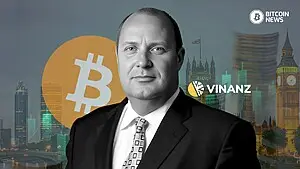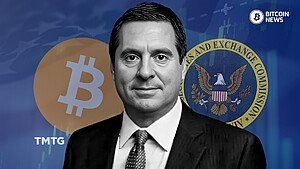Bitcoin has taken yet another significant step toward mainstream acceptance, thanks to the world’s largest asset manager, BlackRock.
During the Q3 2024 earnings call, BlackRock CEO Larry Fink made waves by calling Bitcoin a distinct and legitimate asset class, placing it alongside traditional commodities like gold.
His remarks can potentially solidify Bitcoin’s place in institutional finance, pushing it deeper into the investment portfolios of major institutions worldwide.
Related: Cantor Fitzgerald CEO | Bitcoin is a Commodity Like Gold and Oil
Fink’s latest comments highlight his shift from skepticism to advocacy for Bitcoin. Not long ago, he expressed doubt over Bitcoin’s role in the financial world. But now, the CEO of BlackRock, a firm managing over $9 trillion in assets, is fully on board with the future of the digital asset.
Fink emphasized Bitcoin’s unique position as an alternative to gold during the earnings call, stating:
“We believe Bitcoin is an asset class in itself. It is an alternative to other commodities like gold.”
This shift in stance comes at a time when BlackRock’s Bitcoin exchange-traded fund (ETF), known as IBIT, has gained massive traction, attracting $23 billion in just nine months.
The fund now holds nearly 370,000 BTC, surpassing even MicroStrategy’s holdings, making it one of the largest bitcoin holders in the world. This success is seen as a reflection of increasing institutional trust in Bitcoin’s role as a legitimate store of value.
Fink’s bullish outlook for bitcoin goes beyond just ETFs. He believes that the growing adoption of digital assets will be driven by transparency, liquidity, and better analytics—factors that he says were crucial in the growth of traditional financial markets. Fink explained during the call:
“I truly don’t believe it’s a function of more regulation or less regulation. I think it’s a function of liquidity, transparency, and through that process, we’ll see more acceptance and a broadening of the market.”
Fink also stressed that institutional investors are increasingly engaging in conversations about how bitcoin fits into their portfolios.
According to him, these discussions are not tied to political developments or regulatory changes but are rather about how investors can benefit from the diversification bitcoin offers, much like gold.
He noted, “Conversations we’re having with institutions worldwide [are] about how should they think about digital assets and what type of asset allocation there should be.”
One interesting point Fink made during the earnings call was that he doesn’t see regulation as the primary factor in Bitcoin’s growth. This statement may come as a surprise, given the ongoing discussions in Washington about regulatory frameworks for digital assets.
While some analysts believe that a new administration could bring more Bitcoin-friendly policies, Fink remains skeptical that political changes will be the key driver.
“I do believe the utilization of assets is going to become more and more of a reality worldwide, but I don’t think that’s a function of more regulation,” he said.
Instead, Fink pointed to broader factors, such as market liquidity and data analytics, as the main reasons for Bitcoin’s growing acceptance.
He compared Bitcoin’s adoption to other financial innovations like the mortgage and high-yield bond markets, which also started small but grew as better data and tools became available. “As we build better analytics and data, more acceptance will follow, and the market will broaden,” Fink added.
The significance of this moment can’t be overstated. BlackRock’s massive influence on global markets means that its approval of Bitcoin will likely have a ripple effect, encouraging other institutions to take digital assets more seriously.
Robbie Mitchnick, BlackRock’s head of digital assets, recently called bitcoin a “safe haven” asset, reinforcing the company’s commitment to integrating bitcoin into the financial mainstream.
According to Mitchnick, Bitcoin’s decentralization makes it a valuable hedge against traditional economic risks like currency debasement and political turmoil.
BlackRock’s increasing involvement in the digital asset space represents a significant turning point for Bitcoin and blockchain technology.
Larry Fink’s transformation from a Bitcoin skeptic to a firm advocate underscores the growing institutional acceptance of the scarce digital money as a legitimate asset class.
With BlackRock’s Bitcoin ETF reaching $23 billion in holdings and broader adoption on the horizon, the future looks bright for Bitcoin.
Fink’s message is clear: Bitcoin is no longer just a speculative asset. It’s now a permanent fixture in the global financial ecosystem, with the potential to rival gold as a store of value.
As liquidity, transparency, and analytics improve, we can expect Bitcoin to play an even bigger role in the portfolios of both retail and institutional investors.










